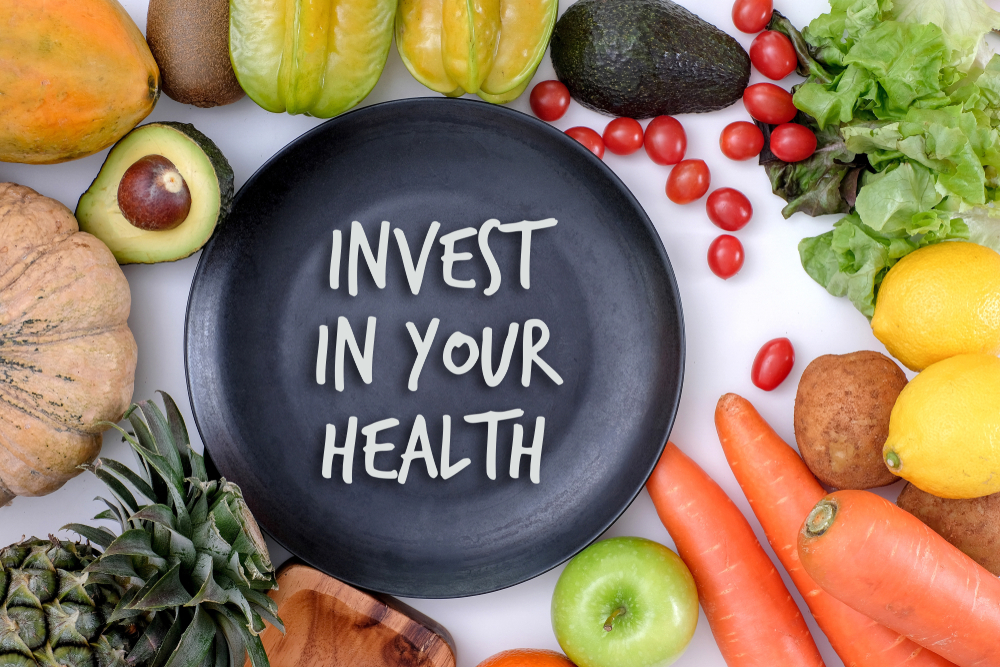Balancing Hormones and Stress: Holistic Nutrition Tips

Table of Contents
Are you feeling overwhelmed by the daily stress of modern life? Balancing hormones and managing stress effectively is crucial for overall well-being. In this article, we’ll delve into holistic nutrition tips that can help you strike a balance and optimize your health and vitality. By understanding the connection between nutrition, hormones, and stress, you can pave the way for a more harmonious and rejuvenated lifestyle.
Understanding the Impact of Nutrition on Hormones and Stress
Have you ever wondered how the food you eat affects your mood and energy levels? Well, it’s all about the interaction between nutrition, your hormones, and how you handle stress. What you put on your plate shapes the way those chemical messengers communicate within your body, influencing everything from how you feel to how you cope with life’s challenges. Let’s dig into how smart food choices can be your ally in keeping everything in check.
The Role of Macronutrients
Macronutrients are the big players when it comes to your health. These include carbohydrates, proteins, and fats, and they do a lot more than just give you energy. The truth is, macronutrients directly influence how your hormones behave. For example, proteins help build and repair tissues, but they also create the enzymes and hormones your body uses to function.
When you eat carbs, they not only fuel your brain and muscles but also impact the levels of insulin in your body—a hormone super important for managing blood sugar. A balanced intake of healthy fats is crucial too; they’re needed for producing hormones such as estrogen and testosterone. So you see, paying attention to macronutrients isn’t just about staying fit—it’s about keeping your hormonal ballet dancing smoothly!
Nutrient-Dense Foods for Hormonal Balance
Feeling good starts with what’s on your plate. Eating nutrient-dense foods can be a game-changer for keeping your hormones happy. These power-packed foods provide vitamins, minerals, and antioxidants that your body needs to create and regulate hormones properly.
For example, dark leafy greens like spinach and kale are loaded with iron and B vitamins – key players for maintaining energy and keeping mood swings at bay. Fatty fish offers omega-3 fatty acids, supporting brain health and reducing inflammation. And let’s not forget about seeds like flax and chia, which are tiny but mighty sources of hormone-friendly fiber and essential fatty acids. By incorporating these nutritious choices into your diet, you can give your hormones the balance they’re asking for.
The Gut-Brain Connection and Stress Management
Have you ever had a “gut feeling” about something? It’s not just a saying—it’s a real connection between your gut and your brain. This connection can play a really important role in handling stress. The billions of bacteria that live in your gut actually talk to your brain, influencing your mood and stress levels.
To keep this communication strong, eating probiotics like yogurt and fermented foods is key. These foods boost the good bacteria in your gut, which in turn helps your brain to stay cool and calm under pressure. It’s like sending reinforcements to help your body cope with stress better. So, the next time you’re having a rough day, consider grabbing some kimchi or kombucha and show your gut some love!
Incorporating Holistic Nutrition into Your Daily Routine

Let’s have a real talk about your day-to-day meals and how they can actually help you keep those stress levels in check. Think of food as your friendly neighborhood “chill pill” that, when chosen wisely, doesn’t just satisfy your cravings but also keeps your body’s chemical messengers, aka hormones, playing nice. Now, we’re going to dive into how to create a meal playbook loaded with all-star eats, discover secret agents known as adaptogens, and explore the Zen art of eating. These small but mighty shifts in your routine can make a world of difference to your inner harmony!
Balancing Hormones: Meal Planning
Creating a meal plan isn’t just about deciding what to munch on throughout the week. It’s about choosing the right foods that can help your body maintain a healthy balance. Foods that support hormone balance are key to managing stress and boosting your overall well-being. Think of your kitchen as your personal pharmacy, with foods rich in essential nutrients that keep your hormones happy.
When you map out your meals, make sure to include plenty of leafy greens, cruciferous vegetables, and healthy fats from sources like avocados or salmon. These superfoods are not only delicious, but they’re also heroes when it comes to keeping your endocrine system in check. Proteins, like lentils and organic chicken, pack a punch for hormone health too. They provide the building blocks for hormone production and help stabilize blood sugar levels, keeping stress at bay.
The Power of Adaptogenic Herbs
Adaptogenic herbs have stolen the spotlight in the world of natural health–and for good reason! These remarkable plants help our bodies resist the ravages of stress. Adaptogens work by normalizing our physiological functions, and they’ve been shown to boost mood, improve focus, and foster a sense of calm.
Icons like ginseng, ashwagandha, and rhodiola come from different corners of the Earth, yet they share a common superpower: They help us adapt. Taking these herbs regularly can mean the difference between feeling frazzled and being in control. Imagine sipping on a cup of herbal tea and feeling your worries melt away—that’s adaptogens working their magic!
Mindful Eating Practices for Stress Relief
Slowing down and appreciating your food can be a game-changer for your mood and hormone health. When you practice mindful eating, you’re tuning into the experience with all your senses. It’s about noticing the colors, smells, flavors, and textures of your meal, and how it makes you feel. This simple act can help reduce stress by bringing your focus to the present moment and away from daily worries.
Mindful eating also lets your body catch up to your brain. By chewing slowly and savoring each bite, you may find that you feel full with less food. This can help prevent overeating, which often happens when we’re stressed and not paying attention to our hunger cues. Taking the time to eat with mindfulness is a tranquil ritual that can bring peace to your day and harmony to your hormones.
Lifestyle Factors and Balancing Hormones

Sometimes, the secret to feeling great isn’t just in what we eat, but also in how we live our lives. Our daily habits can make a big difference in managing our internal chemistry and keeping stress under control. Let’s jump into how moving your body, catching enough Z’s, and finding your zen can play a big role in keeping everything in balance.
Physical Activity and Hormone Regulation
Getting moving isn’t just great for your muscles; it’s like a tune-up for your hormonal health too! When you exercise, your body releases endorphins, which are also known as the “feel-good hormones.” These endorphins do wonders for your mood, helping you to feel happier and less anxious. It’s a fantastic way to combat stress and keep those stress-related hormones, like cortisol, in check.
But the perks don’t stop there. Regular physical activity helps regulate insulin levels, which is super important for controlling blood sugar. And for everyone out there trying to navigate through the ups and downs of energy levels, maintaining a balanced insulin level is key. Just remember that it’s all about consistency, so find activities you enjoy and make them a regular part of your life to get that hormone harmony on point.
Restorative Sleep and its Influence on Hormones
Getting enough Z’s isn’t just about feeling rested; it plays a critical role in regulating your hormones. When you drift off into dreamland, your body gets busy balancing important players like cortisol, the stress hormone, and insulin, which controls your blood sugar levels. Not clocking enough quality sleep can throw these and other hormones off kilter, leaving you more likely to feel stressed or have trouble managing your appetite.
Think of a good night’s sleep as a master switch that resets your hormonal system. It helps boost growth hormone production, which is essential for muscle and tissue repair, and supports proper thyroid function, thus keeping your metabolism in check. To help your body heal and harmonize every night, aim for 7-9 hours of uninterrupted sleep. It’s not just the quantity that counts, but also the quality—make sure your sleep is as peaceful and restful as possible.
Stress-Reducing Techniques for Hormonal Harmony
Feeling chill isn’t just about binge-watching your favorite TV show. It’s also super important for keeping your hormones in check. When you’re stressed out, your body goes on high alert, releasing hormones like cortisol and adrenaline that are great for facing a lion but not so awesome for your daily chill vibes. So, what can you do to keep calm and stay balanced?
First off, deep breathing exercises are like a remote control for your nervous system. Take a few minutes each day to breathe in deeply, hold it, and let it out slowly. This can help kick your body into relaxation mode. Yoga and meditation are also like BFFs for your hormones. They help lower stress levels, which in turn helps balance your hormones. Plus, they’re perfect for boosting your mood and calming your mind. So roll out that mat or find your zen spot and give them a go!
Embracing a Holistic Approach to Hormonal Balance and Stress Management
Taking care of your hormones isn’t just about what you eat—it’s about your whole lifestyle. When you look at your health as a big picture, you see how everything, from your meals to your bedtime, works together to make you feel great or, sometimes, not so hot. It’s like being a detective in your own life, figuring out the clues that tell you what makes your body happy and what throws it off balance.
Going holistic means tuning in to your body’s needs. Maybe you notice you’re more wired when you skip your morning walk, or you’re tossing and turning at night after a day glued to screens. Or perhaps it’s that mid-afternoon slump that has you thinking a quick nap might be better than another cup of coffee. By paying attention, you can start to make changes that not only help level out your hormone highs and lows but also reduce the stress that often tags along for the ride. Embrace this journey to balance—it’s all about taking steps that add up to a healthier, chiller you.
Conclusion
By embracing a holistic approach to nutrition, lifestyle, and stress management, you can take proactive steps toward achieving hormonal equilibrium and emotional well-being. It’s time to prioritize your health and vitality by incorporating these holistic nutrition tips into your daily life, paving the way for a more balanced and harmonious existence.
FAQs
1. How does stress impact hormone balance, and what role does nutrition play in managing stress-induced hormonal imbalances?
Stress can trigger the release of cortisol, a stress hormone, which can disrupt hormonal balance. Nutrition plays a crucial role in managing stress by providing essential nutrients that support the adrenal glands and regulate cortisol levels. Incorporating a balanced diet with adequate vitamins and minerals, such as B vitamins and magnesium, can help mitigate the impact of stress on hormonal balance.
2. Can specific foods help in naturally balancing hormones, and what are some examples of hormone-balancing foods?
Yes, certain foods can help naturally balance hormones. Foods rich in omega-3 fatty acids, like salmon and chia seeds, support hormone production. Cruciferous vegetables such as broccoli and kale contain compounds that aid in estrogen metabolism. Additionally, incorporating whole grains, lean proteins, and a variety of colorful fruits and vegetables can provide essential nutrients for overall hormonal health.
3. How does hydration contribute to hormonal balance, and what role does water play in managing stress-related hormonal fluctuations?
Hydration is vital for hormonal balance as water is involved in various physiological processes, including hormone production and transport. Dehydration can exacerbate stress and contribute to hormonal imbalances. Staying adequately hydrated supports overall well-being and helps the body cope with stress. Aim to drink enough water throughout the day to maintain optimal hydration and support hormonal health.
4. Are there specific lifestyle habits, beyond nutrition, that can contribute to balancing hormones and reducing stress?
Yes, lifestyle habits play a crucial role in hormonal balance. Regular exercise can help manage stress by promoting the release of endorphins, the body’s natural stress relievers. Prioritizing sufficient and quality sleep is essential for hormone regulation, as lack of sleep can disrupt cortisol and growth hormone levels. Additionally, practices such as mindfulness, meditation, and deep breathing exercises can contribute to stress reduction and hormonal balance.
5. Can nutritional supplements aid in balancing hormones, and what should individuals consider when incorporating supplements into their holistic approach to hormonal health?
Nutritional supplements can be beneficial in supporting hormonal balance. Vitamins and minerals like vitamin D, zinc, and magnesium are often associated with hormonal health. However, it’s crucial to consult with a healthcare professional before adding supplements to ensure they are appropriate for individual needs. A personalized approach, considering individual health conditions and potential interactions, is essential to achieve optimal results in managing hormonal balance through supplementation.
Useful resources
- 10 Natural Ways to Balance Your Hormones: Diet Tips and More – Healthline https://www.healthline.com/nutrition/balance-hormones
- 5 Essential Vitamins & Supplements That Help Balance Hormones – OB/GYN Associates of Alabama https://obgynal.com/vitamins-and-supplements-that-help-balance-hormones/
- 6 Steps for How to Balance Hormones Naturally – Dr. Axe https://draxe.com/health/how-to-balance-hormones-naturally/
- How to balance hormones naturally: 11 ways – Medical News Today https://www.medicalnewstoday.com/articles/324031








you are truly a just right webmaster The site loading speed is incredible It kind of feels that youre doing any distinctive trick In addition The contents are masterwork you have done a great activity in this matter
Thank you so much for your kind words! I’m thrilled to hear that you appreciate the site’s loading speed and find the content to be a masterwork. I’m committed to maintaining high standards and ensuring a positive user experience.
Fantastic beat I would like to apprentice while you amend your web site how could i subscribe for a blog site The account helped me a acceptable deal I had been a little bit acquainted of this your broadcast offered bright clear concept
This site is incredible. The splendid material shows the creator’s devotion. I’m dumbfounded and anticipate further such amazing substance.
Thank you for your sharing. I am worried that I lack creative ideas. It is your article that makes me full of hope. Thank you. But, I have a question, can you help me?
Thank you for your kind words; I’m thrilled my article has inspired hope in you, and I’d be more than happy to assist with any questions you have regarding creative ideas.
Thanks for sharing. I read many of your blog posts, cool, your blog is very good.